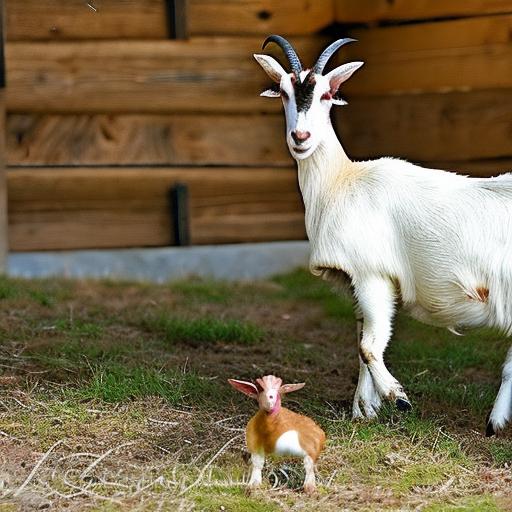Keeping goats and chickens together is a popular practice among small-scale farmers and homesteaders. It offers numerous benefits, including mutual benefits for both animals, cost-effectiveness, and sustainable farming practices. As someone who has personally raised goats and chickens together, I can attest to the advantages of this arrangement. In this article, we will explore the benefits, compatibility, housing requirements, feeding considerations, health concerns, waste management, potential problems, and tips for successful integration of goats and chickens.
Key Takeaways
- Keeping goats and chickens together is a popular practice among small-scale farmers and homesteaders.
- Raising goats and chickens together can provide benefits such as pest control, fertilizer production, and efficient use of space.
- Goats and chickens are generally compatible, but it’s important to provide adequate space and separate feeding areas.
- Housing requirements for goats and chickens should include separate sleeping areas and protection from predators.
- Feeding goats and chickens together can be done, but it’s important to provide appropriate feed and monitor for overconsumption.
- Health concerns when keeping goats and chickens together include the potential for disease transmission and parasite infestations.
- Managing waste when raising goats and chickens together requires proper disposal and composting techniques.
- Potential problems when keeping goats and chickens together include territorial behavior and aggression.
- Tips for successful integration of goats and chickens include gradual introduction, providing adequate space, and monitoring for any issues.
- Keeping goats and chickens together can be a rewarding experience, but it’s important to consider the specific needs and requirements of each animal before making the decision.
Benefits of Raising Goats and Chickens Together
One of the main benefits of raising goats and chickens together is the mutual benefits they provide for each other. Chickens are excellent foragers and will eat insects, ticks, and other pests that may bother the goats. In return, goats provide protection for the chickens by keeping predators at bay. This symbiotic relationship helps to create a healthier environment for both animals.
Another advantage of keeping goats and chickens together is the cost-effectiveness it offers. By sharing the same living space, you can save on housing and fencing costs. Additionally, goats can help control weeds in the pasture, reducing the need for herbicides. Chickens can also contribute to the farm’s income by providing eggs for sale or personal consumption.
Raising goats and chickens together also promotes sustainable farming practices. The goats’ manure can be used as fertilizer for the garden or compost pile, while the chickens’ manure can be added to the compost as well. This reduces the need for chemical fertilizers and promotes a more natural and environmentally friendly approach to farming.
Compatibility of Goats and Chickens
Before introducing goats and chickens to each other, it is important to understand their natural instincts and behaviors. Goats are curious animals that may try to nibble on anything they come across, including chicken feathers or eggs. Chickens, on the other hand, are more skittish and may be intimidated by the larger size of the goats.
To introduce goats and chickens, it is best to start with a gradual introduction. Allow them to see and smell each other through a fence or wire mesh before allowing direct contact. This will help them become familiar with each other’s presence without feeling threatened.
Signs of compatibility between goats and chickens include peaceful coexistence, with the goats ignoring the chickens and the chickens feeling comfortable enough to roam freely around the goats. Signs of conflict may include aggressive behavior from either animal, such as head-butting or pecking. If conflicts arise, it may be necessary to separate them temporarily until they can be reintroduced in a more controlled manner.
Housing Requirements for Goats and Chickens
When it comes to housing requirements, both goats and chickens have specific needs that must be met. For goats, a sturdy shelter that provides protection from the elements is essential. It should have proper ventilation and enough space for all the goats to comfortably lie down and move around. Fencing should also be secure to prevent escape attempts.
Chickens, on the other hand, require a coop that provides protection from predators and the elements. It should have nesting boxes for egg-laying, perches for roosting, and adequate ventilation. The coop should also be easy to clean and maintain to ensure the health and well-being of the chickens.
When keeping goats and chickens together, it is important to provide enough space for each animal. Goats require at least 200 square feet per goat for grazing, while chickens need about 4 square feet per bird in the coop and 10 square feet per bird in the outdoor run. Providing ample space will help prevent overcrowding and reduce the risk of disease transmission.
Keeping their living space clean and safe is also crucial. Regularly cleaning out manure and soiled bedding will help prevent the buildup of bacteria and parasites. It is also important to regularly check for any hazards, such as sharp objects or loose wires, that could potentially harm the animals.
Feeding Goats and Chickens Together
Feeding goats and chickens together requires careful consideration of their nutritional needs. Goats are ruminants and require a diet high in fiber, such as hay or pasture grass. They also need access to fresh water at all times. In addition to forage, goats may require supplemental feed, such as grain or pellets, depending on their age, breed, and production goals.
Chickens, on the other hand, require a balanced diet that includes a combination of grains, protein, vitamins, and minerals. A commercial layer feed is typically recommended for laying hens, while a grower feed is suitable for young chickens. Supplemental treats, such as fruits and vegetables, can also be provided in moderation.
When feeding goats and chickens together, it is important to prevent overfeeding or underfeeding. Goats should have access to forage throughout the day to meet their grazing needs. Chickens should be fed a measured amount of feed to prevent obesity and ensure they receive the necessary nutrients.
Health Concerns When Keeping Goats and Chickens Together

Keeping goats and chickens together can pose certain health concerns that need to be addressed. Both animals are susceptible to various diseases and parasites that can affect their health and productivity.
Common health issues for goats include internal parasites, such as worms, which can cause weight loss and anemia if left untreated. Regular deworming and fecal testing are essential to prevent parasite infestations. Vaccinations for diseases like tetanus and enterotoxemia should also be administered according to a veterinarian’s recommendations.
Chickens are prone to diseases such as coccidiosis, respiratory infections, and external parasites like mites or lice. Proper biosecurity measures, such as keeping the coop clean and providing a dust bath area, can help prevent the spread of diseases. Vaccinations for diseases like Marek’s disease and Newcastle disease are also recommended.
Regular check-ups and vaccinations are important for both goats and chickens to ensure their overall health and well-being. It is also crucial to observe their behavior and appearance for any signs of illness, such as changes in appetite, lethargy, or abnormal droppings. Prompt veterinary care should be sought if any health concerns arise.
Managing Waste When Raising Goats and Chickens Together
Proper waste management is essential when raising goats and chickens together to maintain a clean and healthy living environment. Both animals produce manure that needs to be properly disposed of or utilized.
Goat manure can be a valuable resource for the farm. It is rich in nutrients and can be used as fertilizer for the garden or compost pile. Composting the manure helps break it down into a nutrient-rich soil amendment that can be used to improve soil fertility.
Chicken manure is also a valuable source of nutrients but should be composted before use due to its high nitrogen content. Composting chicken manure helps reduce the risk of pathogens and makes it safe to use as fertilizer.
To keep their living space clean and odor-free, it is important to regularly clean out manure and soiled bedding. This will help prevent the buildup of bacteria and parasites that can affect the health of the animals. Providing proper drainage in the housing area can also help prevent standing water, which can attract pests and contribute to unsanitary conditions.
Potential Problems When Keeping Goats and Chickens Together
Keeping goats and chickens together can present certain challenges that need to be addressed to ensure their safety and well-being.
Predators are a common concern when raising goats and chickens together. Both animals are vulnerable to attacks from predators such as foxes, coyotes, or raccoons. It is important to provide secure fencing and housing to protect them from these threats. Electric fencing or guardian animals, such as dogs or llamas, can also be effective deterrents.
Aggressive behavior between goats and chickens can also be a problem. Goats may try to head-butt or chase the chickens, causing stress and potential injury. It is important to monitor their behavior and intervene if any aggression occurs. Providing separate feeding and watering stations can help reduce competition and prevent conflicts.
Escape attempts are another potential problem when keeping goats and chickens together. Goats are known for their climbing abilities and may try to escape over fences or through small openings. Ensuring that the fencing is secure and free from any gaps or weak spots will help prevent escape attempts.
Tips for Successful Integration of Goats and Chickens
To ensure a successful integration of goats and chickens, it is important to follow a few key tips:
1. Patience and gradual introduction: Allow the animals to become familiar with each other’s presence before allowing direct contact. This will help reduce stress and prevent conflicts.
2. Providing separate feeding and watering stations: This will help reduce competition and prevent aggression between the animals.
3. Monitoring their behavior and health regularly: Regularly observe their interactions and check for any signs of illness or stress. Promptly address any concerns that arise.
Is Keeping Goats and Chickens Together Right for You?
Keeping goats and chickens together offers numerous benefits, including mutual benefits for both animals, cost-effectiveness, and sustainable farming practices. However, it is important to consider the compatibility, housing requirements, feeding considerations, health concerns, waste management, potential problems, and tips for successful integration before deciding if it is right for you.
By understanding the needs of both goats and chickens and taking the necessary precautions, you can create a harmonious environment where both animals thrive. If you are willing to put in the time and effort, keeping goats and chickens together can be a rewarding and enjoyable experience. So why not give it a try and see if it works for you?
If you’re considering keeping goats and chickens together, it’s important to plan their living arrangements carefully. One crucial aspect is finding the right location for your chicken coop. Poultry Wizard offers a helpful article on “Where to Put Your Chicken Coop” that provides valuable insights into choosing the ideal spot for your coop. Additionally, they have another informative piece on “Chicken Coop Portage,” which discusses the benefits of moving your chicken coop around your property. Lastly, if you’re in need of a reliable chicken coop, Poultry Wizard’s article on the “Producers Pride Sentinel Chicken Coop” provides an in-depth review of this popular option. Check out these articles for expert advice and recommendations on creating a harmonious environment for your goats and chickens.
FAQs
Can goats and chickens live together?
Yes, goats and chickens can live together in the same space. However, it is important to ensure that the space is large enough to accommodate both animals comfortably.
Do goats and chickens get along?
In general, goats and chickens get along well. However, it is important to introduce them to each other slowly and monitor their interactions to ensure that there is no aggression or bullying.
What are the benefits of keeping goats and chickens together?
Keeping goats and chickens together can have several benefits. For example, goats can help control weeds and brush, while chickens can help control insects and pests. Additionally, their manure can be used as fertilizer for gardens and crops.
What are the potential problems of keeping goats and chickens together?
One potential problem of keeping goats and chickens together is that goats may eat chicken feed, which can lead to nutritional imbalances for the chickens. Additionally, goats may accidentally injure or kill chickens if they become too rough during play.
What should I consider before keeping goats and chickens together?
Before keeping goats and chickens together, it is important to ensure that you have enough space for both animals and that their housing and fencing needs are met. Additionally, you should consider the potential for disease transmission between the two species and take steps to prevent it.
Meet Walter, the feathered-friend fanatic of Florida! Nestled in the sunshine state, Walter struts through life with his feathered companions, clucking his way to happiness. With a coop that’s fancier than a five-star hotel, he’s the Don Juan of the chicken world. When he’s not teaching his hens to do the cha-cha, you’ll find him in a heated debate with his prized rooster, Sir Clucks-a-Lot. Walter’s poultry passion is no yolk; he’s the sunny-side-up guy you never knew you needed in your flock of friends!







